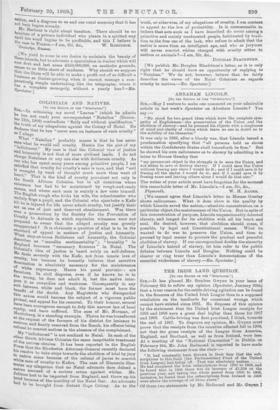COLONIALS AND NATIVES.
[To THE EDITOU THY "SPUCTATOR."1 [To THE EDITOU THY "SPUCTATOR."1 BI11,—Iu criticising my novel " Leaven " (which he admits he has not read) your correspondent " Natalian" (Decem- ber 12th, 1908) contradicts " flatly and without qualification " the truth of my allegations against the Colony of Natal. Be declares that lie has "never seen an instance of such cruelty"
as I allege.
What "Natalian" probably means is that be has never seen what be would call cruelty. Herein lies the gist of my "indictment." My case is that the Colonial view of justice and humanity is not that of more civilised lands. I do not charge Natalians or any one else with deliberate cruelty. As one who has spent many years among primitive people, I am satisfied that cruelty for cruelty's sake is rare, and that "evil la wrought by want of thought much more than want of heart." That is the kind of cruelty prevalent not only in the South African Colonies, but in all countries where existence has had to be maintained by rough-and-ready ,,,tneans, and where each man is mainly a law unto himself. The English rough who kicks his wife, the schoolmaster who unduly flogs a pupil, and the Colonial who sjamboks a Kafir till he is injured for life never admit cruelty, but justify their act es one of just and deserved chastisement. Was there ever a prosecution by the Society for the Prevention of Cruelty to Animals in which reputable witnesses were not prepared to swear that the alleged cruelty was grossly exaggerated ? It is obviously a question of what is to be the standard of appeal in matters of justice and humanity. What stay-at-home Britishers call humanity, the Colonial describes as "maudlin sentimentality" ; " brutality " in England becomes " necessary firmness " in Natal. The Colonial's idea of justice is based solely on self-defence. Ire deals severely with the Kafue not from innate love of cruelty, but because he honestly believes that assertive domination is absolutely necessary for the maintenance of white supremacy. Hence his penal provision e are ferocious. In civil disputes, even if he knows he is in the wrong, he dare not admit it, lest the native inter- Pret it as cowardice and weakness. Consequently in any suit between white and black, the former must have the benefit of the doubt. Any Magistrate who disregarded Ulla axiom would become the subject of a vigorous public Protest, and appeal for his removal. To their honour, several have been courageous enough to defy this narrow law of local equity, and have suffered. The case of Mr. Norman, of Alaritzburg, is a standing example. Thrice he was transferred at the request of the farmers of his district for leniency to natives, and finally removed from the Bench, his offence being refused to convict natives in the absence of the complainant. 13' "indictment" is not confined to Natal. In each of the other South African Colonies the same inequitable treatment of the natives obtains. It has been reported in the English Press that the Rhodesian Attorney-General recently declared h, is resolve to take steps towards the abolition of trial by jury in native cam., because of the refusal of juries to convict white men of cruelty to Kafirs. The case of Diuuzuln illus- trates my allegation that no Natal advocate dare defend a native accused of a serious crime against whites. Mr. Jellicoe had to be imported from England, and threw up his brief because of the hostility of the Natal Bar. An advocate had to be brought from distant Cape Colony. As to the truth, or otherwise, of my allegations of cruelty, I am content to appeal to the law of probability. Is it unreasonable to believe that acts such as I have described do occur among a primitive and mainly uneducated people, habituated by tradi- tion to the free use of the lash, who refuse to admit that the native is more than an intelligent ape, and who as jurymen will never convict whites charged with cruelty either to natives or animals P—I am, Sir, &c.,
DOUGLAS BLACKBURN.
[We publish Mr. Douglas Blackburn's letter, as it is only right that ho should have an opportunity of replying to " Natalian." We do not, however, believe that he fairly describee the views of the Natal Colonists as regards cruelty to natives.—ED. Spectator.]










































 Previous page
Previous page